30th June 2025: You may find it hard to believe (I certainly do) but it's now been a quarter of a century since this website was created!
In June 2000, four short months after the release of Two Against Nature, I was inspired by its lyrical content to create this website. It started modestly, as a single page hosted on my AOL account listing a mere 33 definitions. And here we are 25 years later, with the site moving to its own domain in 2004 and receiving a major expansion and upgrade in 2016, the site is now more than quadruple its original size, thanks mainly to the constant and enthusiastic feedback I've received from many, many Dan fans over the past two-and-a-half decades.
To mark this silver anniversary, I've added another 8 definitions to the dictionary. Unfortunately there haven't been any new Steely Dan or Donald Fagen solo records since the last site update in 2020, however we had the next best thing, with the long-overdue release of Linda Hoover's album I Mean To Shine in 2022: originally recorded in 1970 but never released at the time due to record company shenanigans. To the extreme interest of Dan-fans, 5 out of the album's 11 tracks were written by Becker & Fagen, some 12 months before they formed Steely Dan — and none of these 5 songs were ever subsequently released on any of the band's LPs.
This inspired me to make this site update all about "unreleased" Dan songs, i.e. Becker/Fagen tracks that for various reasons never ended up on a Steely Dan studio album. Other than the Linda Hoover album, most of these "lost" songs come from the demos the duo recorded between 1969 and 1971 (available on multiple low-quality bootlegs). Simply scroll down this page to see all the new entries.
Thanks to those who've written to me over the years with input & suggestions. Keep the feedback coming, folks — even without any new albums on the horizon, there's still plenty of uncracked code in the Steely Dan lexicon! Visit the Feedback page to send your suggestions for future dictionary entries.
Also, you can enter your email address below to receive notification when this site is updated in future. (No spam, I promise!)
Listing 8 new entries:
Song: Roaring of the Lamb (unreleased track)
 A bivouac, sometimes known as a "bivvy" for short, is a temporary camp, usually without tents or cover, used especially by soldiers or mountaineers.
A bivouac, sometimes known as a "bivvy" for short, is a temporary camp, usually without tents or cover, used especially by soldiers or mountaineers.
Bivouac is an 18th century French word, however it originated from the earlier Swiss German word Bîwacht meaning "additional guard at night", referring to the type of military or citizens' patrol who might use such a temporary encampment in the course of their nocturnal sentry duties.
Song: Roaring of the Lamb (unreleased track)
 A major tree-lined boulevard that runs 6 kilometres (nearly 4 miles) east-west through the New York City borough of Brooklyn.
A major tree-lined boulevard that runs 6 kilometres (nearly 4 miles) east-west through the New York City borough of Brooklyn.
Opened in 1866, it is considered the world's first parkway: in fact the word "parkway" was coined by its designers, meaning "a landscaped road built expressly for pleasure-riding and driving".
Link: New York City Department of Parks & Recreation: Eastern Parkway
Song: Roaring of the Lamb (unreleased track)
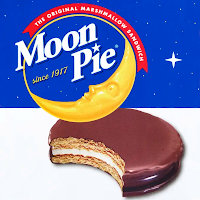 Brand of American confectionery/snack food, particularly popular in Southern US states.
Brand of American confectionery/snack food, particularly popular in Southern US states.
Invented in 1917 by the Chattanooga Bakery in Tennessee, Moon Pies consist of two circular biscuit/cookie layers (Graham crackers to be precise) enclosing a marshmallow centre, all covered in chocolate.
Those with a sweet tooth in the UK or Ireland will be familiar with Wagon Wheels, a similar British confection introduced in the 1940s.
Song: A Little With Sugar (unreleased track)
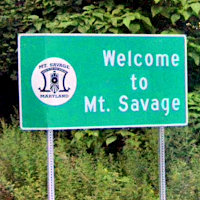 Small town located in the US state of Maryland, almost midway between Pittsburgh and Washington D.C.
Small town located in the US state of Maryland, almost midway between Pittsburgh and Washington D.C.
Originally a farming settlement, in the mid 19th century the town grew rapidly thanks to its iron works, which for a time were the largest in America and played a critical role in the expansion of the then-booming railroad industry.
However, in the century-and-a-half since then, the decline of these industries also shrank the town, which nowadays has a population of just over 700.
Song: Dallas (non-album track)
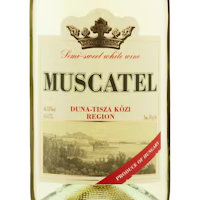 A type of wine. In most countries, the word can refer to any wine made from muscat grapes — a sweet grape variety normally used for eating or to make raisins. Accordingly, traditional Muscatels are most often sweet or semi-sweet white wines.
A type of wine. In most countries, the word can refer to any wine made from muscat grapes — a sweet grape variety normally used for eating or to make raisins. Accordingly, traditional Muscatels are most often sweet or semi-sweet white wines.
However, in the US the term is used specifically only for cheap fortified wines made from the same grapes. This usage dates from the end of Prohibition in the 1930s, when the large demand for wine led some producers to mix crushed muscat grapes with sugar and brandy to make an inexpensive beverage which they also called "Muscatel", leading Americans to primarily associate the name with "wino wine".
Link: Los Angeles Times: Muscatel Comes Out of the Paper Bag and Into Polite Society
Song: A Horse in Town (unreleased track)
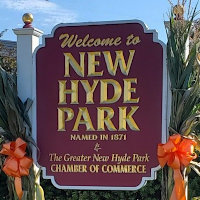 A village in Nassau County, on Long Island, New York. Having a population of 10,000, it is primarily a commuter village due to its close proximity and relatively short commute to Manhattan.
A village in Nassau County, on Long Island, New York. Having a population of 10,000, it is primarily a commuter village due to its close proximity and relatively short commute to Manhattan.
The village was originally simply called "Hyde Park" after a country estate which formerly stood there — the estate was not named after London's famous Hyde Park as you might expect, but after the landowner's wife Ann Hyde. The settlement was further renamed as "New Hyde Park" in the late 19th century to avoid confusion with another New York town called Hyde Park, near Poughkeepsie.
Song: More to Come (unreleased track)
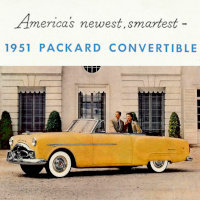 A former brand of American automobiles.
A former brand of American automobiles.
Founded in Ohio in 1899 by brothers James and William Packard, the company moved to Detroit in the early 1900s and over the next three decades established themselves as a successful and sought-after manufacturer of high-quality luxury automobiles.
Their fortunes dipped after World War II however, with the company merging with Studebaker in 1954 and the Packard brand being phased out altogether in 1959.
Song: Roaring of the Lamb (unreleased track)
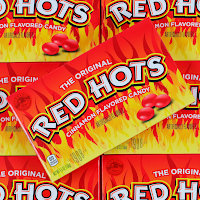 An American brand of cinnamon-flavoured hard candy.
An American brand of cinnamon-flavoured hard candy.
Red Hots were launched in the early 1930s by the Ferrara Candy Company of Chicago, and are still available today. They take their name from the red colour of the candy itself plus the "spiciness" of the intense cinnamon flavour.
 Menu
Menu